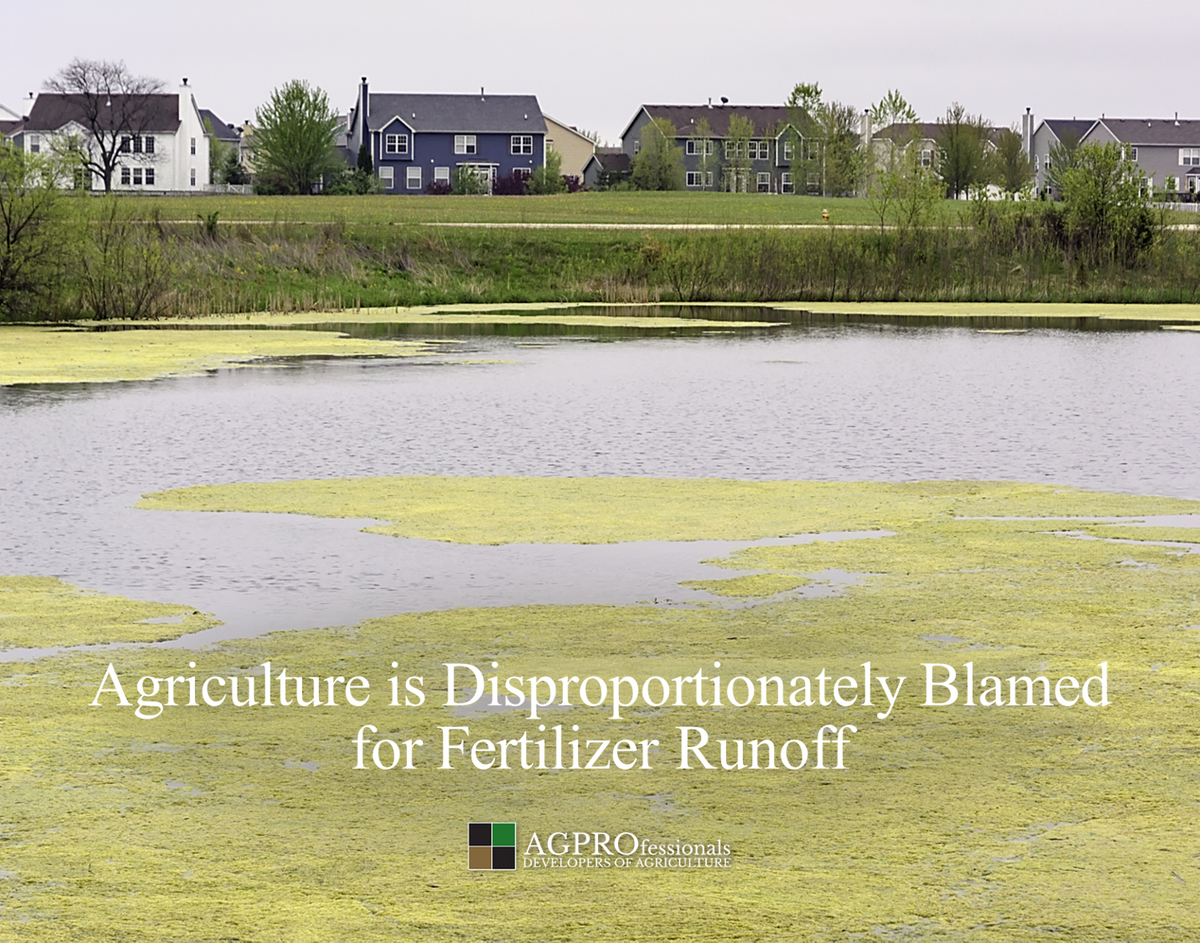
Agriculture Is Disproportionately Blamed for Fertilizer Runoff
Nutrient runoff, i.e., fertilizers escaping from soil into rivers, lakes, and groundwater, has long been portrayed as primarily an agricultural problem. But the truth is more complicated. Mismanagement and overapplication of nutrients can happen anywhere fertilizer is used, and research shows that agriculture is far from the only contributor.
According to the Center for Watershed Protection, lawns receive high applications of nitrogen fertilizers up to 100 pounds of inorganic nitrogen per acre. When lawns, golf courses, parks, and suburban landscaping are factored in, urban fertilizer use contributes significantly to nutrient loading in U.S. waters.
The Blame Game: Who’s Really Responsible?
Row-crop agriculture is frequently singled out in discussions about nutrient runoff, with headlines often pointing to the Gulf of Mexico’s “dead zone” or algal blooms in freshwater lakes. While agriculture is part of the equation, it is far from the whole story.
- Urban and suburban sources: Fertilizer applied to lawns, gardens, golf courses, and sports fields often washes off during irrigation or rain events. Unlike farms, where runoff can be managed with conservation practices, urban runoff typically flows untreated into storm drains and waterways.
- Wastewater treatment systems: Leaky septic tanks and municipal wastewater plants also release nitrogen and phosphorus, adding to nutrient pollution.
- Atmospheric deposition: Industrial and vehicle emissions contribute reactive nitrogen to water bodies when deposited via rainfall.
The fact is, nutrient runoff is a shared challenge across rural, suburban, and urban landscapes.
Farmers Have Incentives to Use Less
Unlike homeowners who may apply fertilizer for purely aesthetic reasons, farmers face strong economic incentives to minimize fertilizer use. Fertilizer is one of the largest input costs in crop production. Prices paid by producers have risen steeply, over 250% from 1986 to 2022, with a notable spike of 28% in 2021 due to the supply chain issues caused by the COVID-19 pandemic. However, prices did decrease in 2023 as supply chains stabilized and demand decreased.
This economic volatility and increased prices have driven farmers to adopt efficiency-focused practices to maximize yields with the least input. Every pound of fertilizer wasted is money lost, so farmers are motivated to apply nutrients carefully, not excessively.
By contrast, many suburban and recreational landscapes, including lawns, golf courses, and parks, provide no food or fiber, yet receive heavy fertilizer applications to maintain lush, green turf, often with no evidence to support the need for nitrogen, as indicated by soil testing and sampling.
The Four Rs of Nutrient Stewardship
To maximize the efficiency of their fertilizer application, modern farmers increasingly follow the “Four Rs” of nutrient management:
- Right Source – using the appropriate type of fertilizer
- Right Rate – applying only what the crop requires
- Right Place – targeting the fertilizer where roots can best access it
- Right Time – applying when crops can take it up, reducing runoff risk
Following the Four Rs can significantly cut nutrient losses while maintaining or even boosting yields.
Putting It in Perspective
Fertilizer runoff is a national challenge, but agriculture is too often portrayed as the sole culprit. The reality is that urban lawns, golf courses, wastewater, and industry contribute significantly to nutrient pollution. Farmers, meanwhile, continually improve efficiency, invest in conservation practices, and work toward sustainability, because their livelihoods depend on it.
When it comes to solving nutrient runoff, pointing fingers won’t get us far. Policy makers, activists, and solution-hunters should recognize that there is a shared responsibility across farms, cities, and industries, and consider priorities: aesthetics or food.
AGPROfessionals: Helping Farmers with Science-Based Management
At AGPROfessionals, we recognize that protecting both growers and the environment requires science-based management. Our agronomy services are built around the Four Rs, ensuring farmers achieve yield goals while minimizing environmental impacts. Our trained agronomists provide tailored fertilizer and manure management recommendations to keep nutrients in the field where they belong.
